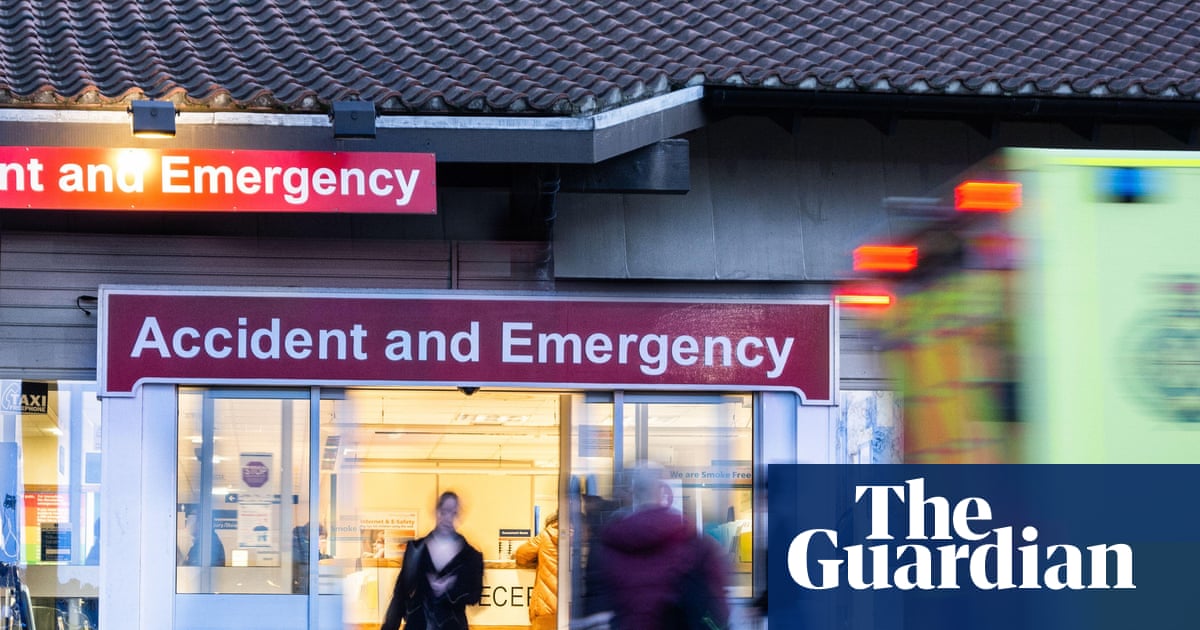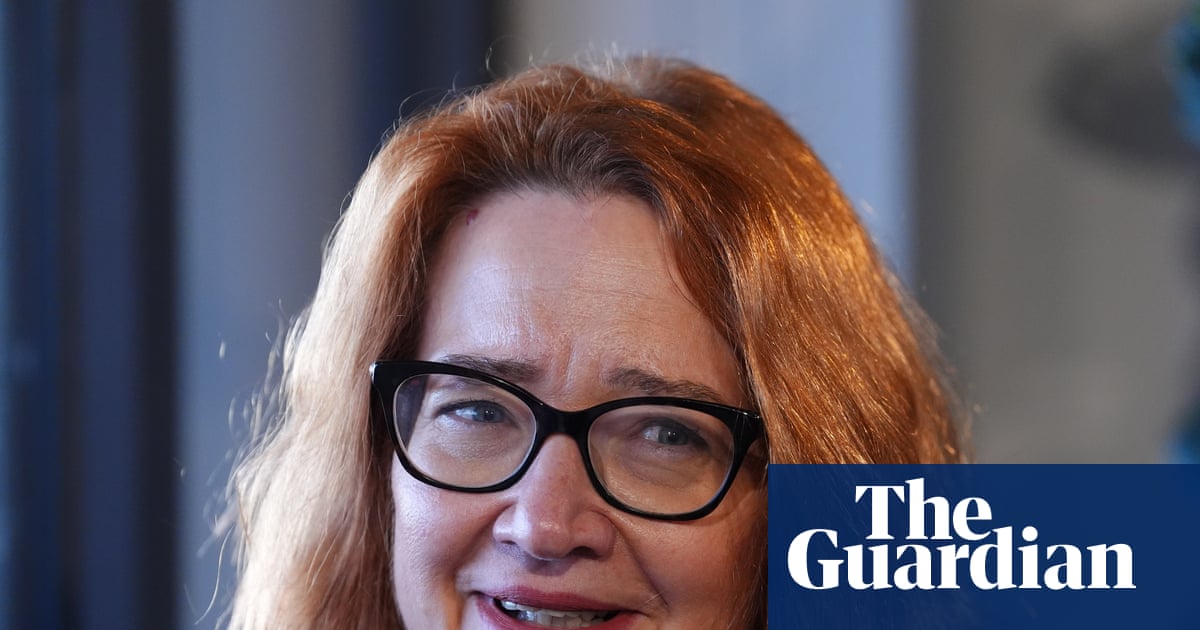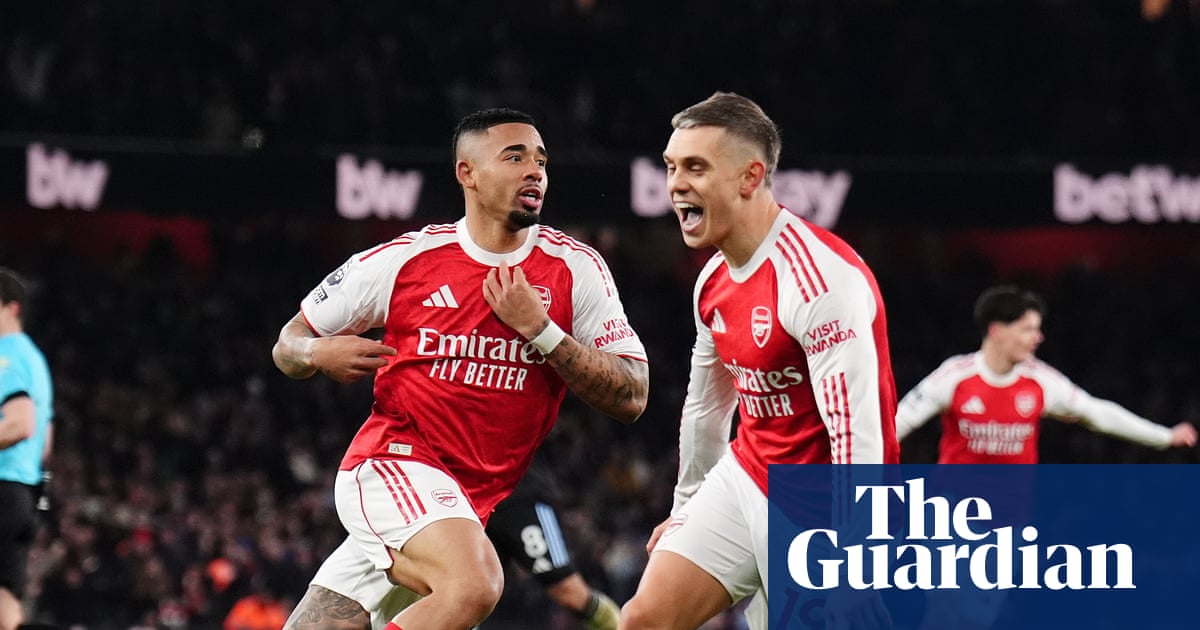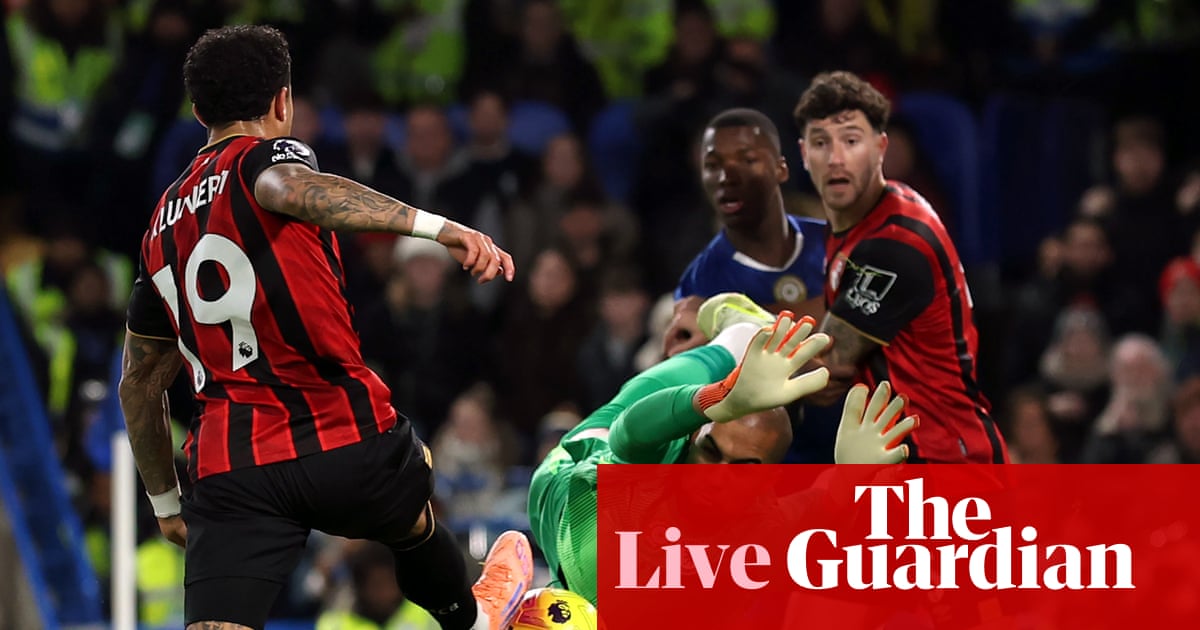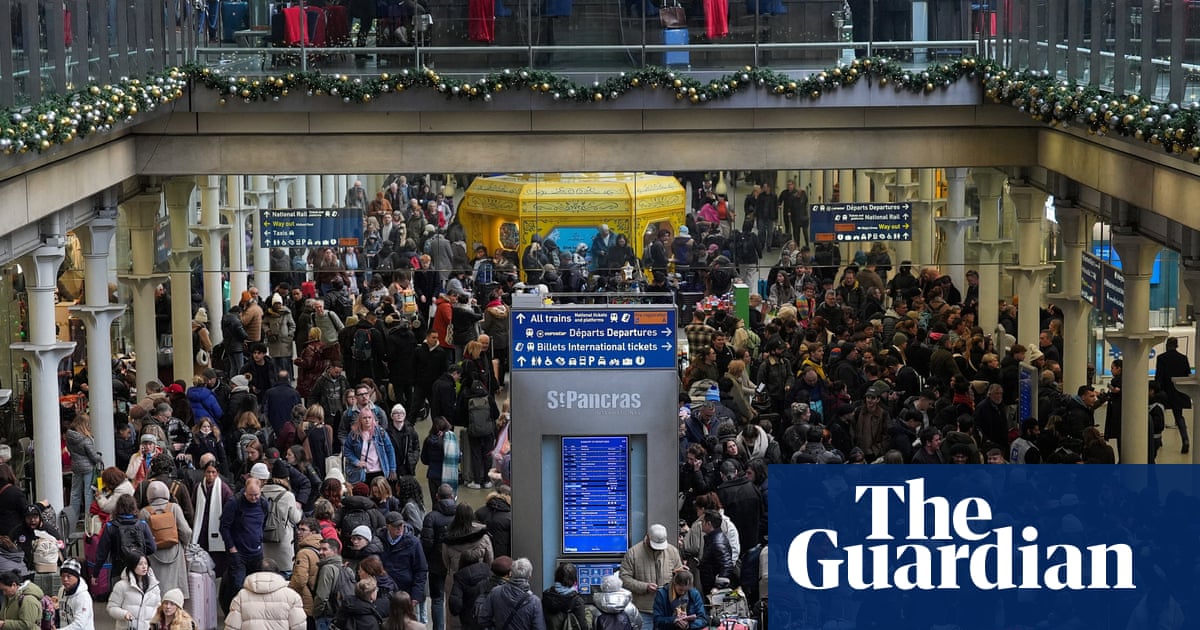Key events Show key events only Please turn on JavaScript to use this feature
Eurostar to run doubledecker trains through Channel tunnel from 2031
Eurostar is to start running doubledecker trains through the Channel tunnel to meet growing demand for international rail travel from the UK – but not until 2031.
The rail operator announced it had signed a €2bn (£1.7bn) deal for at least 30 – and up to 50 – new trains from the manufacturer Alstom.
The doubledeckers will start operating from 2031, with each able to carry more than 1,000 passengers.
Eurostar said the Celestia trains, the first high-speed doubledeckers to run on the UK mainland, would have about 20% more seats than its biggest existing trains. Some of the extra space would be taken up by stairs, but it would also be used for wheelchairs, bicycles, additional legroom and “surprises”, it said.
The SNCF-owned operator plans to maintain the entire fleet at the Temple Mills depot in north-east London, which it hopes to redevelop with a further €80m investment, creating 350 jobs.
Reeves says economic damage caused by Brexit forcing her to take action in budget
Rachel Reeves has blamed a heavier than anticipated blow from Brexit and austerity for forcing her to take action to balance the books at next month’s budget.
In her clearest attempt to draw Brexit into the framing of her imminent tax and spending decisions, the chancellor said leaving the EU was turning out to have caused more damage than official forecasters had previously outlined.
The chancellor hinted she was braced for a sharp downgrade in growth forecasts from the Treasury’s independent watchdog, the Office for Budget Responsibility (OBR), alongside what is shaping up to be a crucial budget. She said at an investment event in Birmingham on Tuesday”
The OBR, I think, are going to be pretty frank about this – that things like austerity, the cuts to capital spending and Brexit have had a bigger impact on our economy than was even projected back then.
That is why we are unashamedly rebuilding our relations with the EU to reduce some of those costs, that in my view were needlessly added to businesses since 2016 and since we formally left a few years ago.
The chancellor’s intervention comes amid growing confidence within Keir Starmer’s government to speak out about the damage of Brexit, as the decision to leave the EU almost a decade ago continues to weigh heavily on Britain’s economic performance.
Real living wage to rise by almost 7% in boost for low-paid UK workers
In other good news… Almost half a million workers are to receive a pay boost after it was announced that the real living wage paid voluntarily by 16,000 UK companies will rise to £13.45 an hour in April.
Distinct from the national living wage, which is a statutory minimum, the real living wage is calculated each year based on the cost of essentials, and is paid by more than half of the companies in the FTSE 100.
Born from a long-running campaign about the difficulties of making ends meet on poverty pay, employers can agree to pay the more generous rate. The Japanese clothing store Uniqlo, the University of Salford and Truro city council are among the latest to sign up.
The real living wage will rise to £13.45 an hour nationwide from April – an increase of 85p an hour, or 6.7%. In London, it will go up 95p, or 6.9%, to £14.80 an hour.
Lidl profit triples as it expands, hiring 3,000 new staff

Joanna Partridge
German discounter Lidl said it gained “record momentum” in Britain over the past year as its low prices attracted more customers to its stores at a time of high food price inflation and tight household budgets.
The discount grocer’s pre-tax profit more than tripled in the year to the end of February, climbing to £156.8m from £43.6m a year earlier, while its revenue rose by nearly 8% to £11.7bn.
It comes as Lidl is preparing to open its 1,000th British store next month and is continuing its expansion plans, with 13 new locations expected to open before Christmas. Its new store openings saw it hire 3,000 new staff in the year to the end of February.
The discounter’s continued expansion plans have seen it come close to overtaking Morrisons to become the UK’s fifth largest grocer, with a current market share of 8.2% (compared to Morrison’s 8.3%) according to the most recent grocery market share data from Worldpanel by Numerator.
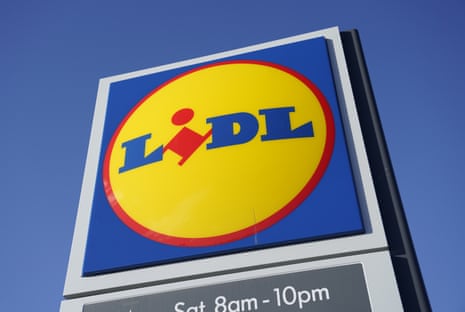
As a result, Lidl is calling itself the “fastest-growing bricks-and-mortar grocer” and says it has held this position for over two years.
The retailer said it had experienced over £400m in direct switching from its rivals, citing Worldpanel figures from February, combined with almost £500m in growth from customer loyalty, which led to an almost £900m increase in turnover.
Ryan McDonnell, chief executive of Lidl GB, said:
More households are choosing to shop with us more often, because we continue to deliver on our promise of outstanding quality at the lowest possible prices.
Lidl said it had also upgraded some of its existing stores over the past six months, allowing it to increase its fresh produce and bakery offering, while it said its app was helping to drive footfall to its shops.
The downside surprises were widespread across core goods and services, Wood said.
Core goods inflation ticked down to an annual rate of 1.5% from 1.6% in August, despite the erratic games, toys and hobbies category jumping, likely driven by volatile computer games.
Services inflation stayed at an annual rate of 4.7%.
Wood has crunched the numbers.
Clothes price inflation accelerated largely as we expected, matching the strong BRC Shop Price Index for that component, but new car prices fell 0.3% month-to-month, down from 0.1% in August and the weakest since February. Used car prices were unsurprising, rising 0.3% month-to-month. Furniture and other goods also surprised us modestly on the downside.
Six of the nine high-level services sub-components we have in our table surprised us to the downside, with volatile car insurance one of the minority with an upside surprise. Accommodation services also surprised us, rising 3.2% month-to-month, up from -2.2% in August and above our call of 2.7%. Still, broadly we expected a strong month for hotel months, which had been signalled by our tracker.
A large drop was always likely as airfares unwound the unusually large seasonal rise between August and September. Airfares still boosted inflation 10bp compared to August, just 1bp less than we assumed, because prices fell even faster in September 2024.
Private school fees rose 4.4% month-to-month, strong given how much headline inflation has slowed from the peaks that helped support this component, but weaker than we’d expected given the possibility that schools would still be passing through the VAT hike on fees implemented in January.
Elsewhere, catering services inflation ticked up to 4.3% from 4.2% in August but undershot our call, rent inflation slowed 0.1pp to 4.3%, again surprising our call, communication inflation dropped 140bp, much weaker than we assumed. Within other services inflation in our table, recreation and cultural services were much weaker than expected, falling 0.3% month-to-month. We’ll get into the details but suspect live music explains that. Again partly erratic, but part of a widespread set of downside news today.
Cutting through the noise, rate setters’ measure of underlying services inflation—excluding indexed and volatile components, rents and foreign holidays—fell to 3.9% in September from 4.3% in August, the weakest since February 2022.
Monica George Michail, associate economist at National Institute of Economic and Social Research, a respected think tank, expects the Bank of England to pause rates until at least February.
Rob Wood, chief UK economist at Pantheon Macroeconomics, said widespread downside surprises across the inflation components raise the chances of an interest rate cut in December.
September was likely the peak in this inflation hump, and it came in 20bp weaker than the monetary policy committee [MPC] and we expected. 3.8% inflation is still uncomfortable territory for the MPC, nearly double their target, and we expect the path down to 2% to be protracted.
Some caveats mean we need to be cautious with this release. CPI was collected late, on September 16, compared to the September 9 date we and we think the market expected, which will have weighed on air fares and hotel prices. Underlying services inflation remains close to 4% and surveys suggest it will stay there at least until the spring. Erratic movements in some components, and a surprise in rents that the MPC look through, explain some of the downside.
But those caveats fail to over-ride the dovish news completely. So the five doves on the committee will likely take heart. A rate cut by December looks likely now. We still think the MPC will skip November—the growth data and stabilising jobs suggest they can afford to wait still—and the 26 November budget also seems forth waiting for, as well as another round of inflation data. We’ll chew over the data in detail today, but our initial reaction is that we will likely bring forward our rate cut call from February to December. We’re not throwing in the towel on our structural hawkish views, as we say we think the path down for inflation will be protracted. But the doves on the MPC will want to lower rates if they can.
Financial markets are betting that the next interest rate cut will come sooner than previously thought.
Another reduction is now fully priced in by February, compared with March before the inflation figures, according to interest rate futures.
Markets also expect more easing next year than previously, pricing in 64 basis points of Bank of England rate cuts versus 57 bps before the inflation data was released.
Some economists are saying this is probably the peak in inflation. What does this mean for interest rates?
Paul Dales, chief UK economist at Capital Economics, said:
CPI inflation was lower than feared in September, as it stayed at 3.8% rather than rising to 4.0% or above. We doubt this will prompt the Bank of England to cut interest rates from 4% in November. But it increases the chances of the next cut happening by February in line with our forecast and it supports our view that interest rates will be reduced to 3% next year.
What’s more, this will probably be the peak in inflation. Our forecast is for CPI inflation to fall to 3.5% or below in October, not least due to the declines in utility and fuel prices that we already know about. Food price inflation may yet rise further, perhaps back above 5.0% by December, but there are… good reasons to expect it to fall back next year.
And if we’re right in thinking that weak employment will significantly weigh on wage growth next year, then CPI inflation may surprise most people by falling to 2.0% by the end of next year.
Turning to the budget, Dales said:
It’s possible the chancellor will add to that trend in the budget on 26 November, either by reducing inflation directly (cutting VAT on utilities from 5% to 0% would trim CPI inflation by 0.2ppts) or indirectly as higher taxes chip away at economic activity.
Petrol prices and airfares fell last month, but not as much as a year earlier.
The average price of petrol fell by 0.2p a litre between August and September to an average of 134p a litre in September, but last year prices fell by 5.5p a litre. Diesel prices were down by 0.4p a litre to 141.8p a litre.
Air fares fell by 28.8% between August and September, the third-largest September decrease since the collection of airfares changed from quarterly to monthly in 2001. However, air fares fell by 34.8% a year earlier, which was the largest September drop since 2001.
This meant annual transport inflation rose to 3.8% from 2.4%.
This was offset by lower prices for leisure activities, in particular live music concerts, where monthly prices fell by 8.6% compared with a rise of 5.8% a year earlier. Overall, the annual inflation rate in recreation and culture fell to 2.7% from 3.2%.
Here’s our full story:
Introduction: UK inflation stays at 3.8% as food price rises slow for first time since March
Good morning, and welcome to our rolling coverage of business, the financial markets and the world economy.
UK inflation was unchanged last month, defying expectations of a rise to 4%, with food price rises finally slowing.
The annual rate of inflation, as measured by the consumer prices index (CPI), was 3.8%, the same as August’s reading, according to Office for National Statistics data.
Inflation is still almost double the Bank of England’s 2% target, and has been above it for 12 months in a row.
The core rate of inflation, which strips out volatile food and energy costs, dipped to 3.5% from 3.6% in August.
This is good news for the chancellor, Rachel Reeves. She said last week she would announce “a range of policies” in her 26 November budget to “bear down on some of the costs that people face”.
Importantly, food prices dipped by 0.2% in September from August amid discounting at supermarkets, taking the annual growth rate to 4.5%, from 5.1% in August.
It was the first time since May last year that food prices have fallen on the month; and the first time since March this year that the annual rate has slowed.
The Consumer Prices Index (CPI) rose by 3.8% in the 12 months to September 2025, unchanged from August 2025.
The September, August and July 2025 figures were the joint-highest recorded since January 2024, when the rate was 4.0%.
Read the article ➡️ https://t.co/MkZBeF7kCc pic.twitter.com/sQ6mUCGB11
Gold rose by 0.5% at $4,145 an ounce this morning after its biggest one-day fall in five years.
The precious metal tumbled more than 5% on Tuesday, as a record-breaking rally in recent weeks reversed at the end of the Diwali gold buying season. Gold fell as low as $4,003.39 an ounce.
Alex Hill, managing director at Electus Financial in Auckland, told Reuters:
What goes up has to go down. You’ve had a market that’s gone parabolically higher, at some points it’s going to get some relief.
Citi analysts wrote in a research note:
Gold had run ahead of the ‘debasement’ story. We had flagged that prices were stretched to levels previously associated with pullbacks and had reduced our long position accordingly.
The Agenda
-
9.30am BST: UK house prices
-
Noon BST: US MBA Mortgage applications
-
1.25pm BST: ECB president Christine Lagarde speech
-
3.30pm BST: US EIA Crude oil stocks change
-
7pm BST: Annual City banquet at Mansion House and speeches

 2 months ago
58
2 months ago
58


